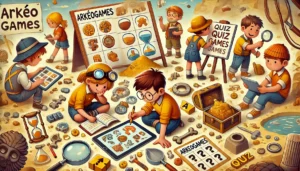At the 16th meeting of the European Association of Archaeologists (EAA), ArkéoTopia was able to measure how much French archaeology students really behind compared to their European counterparts, particularly as regards student associations such as there are in Germany and Poland for example. With the objective of helping students to take charge of their career, ArkéoTopia offers its expertise to students to aid their career orientation, access to the world of work and to the national organization of student associations following the model of the European associations encountered.
ArkéoTopia took part in the EAA’s round table entitled “Current position of students” at the Hague (Holland) last September. During this round table, several observations were made thanks to the presence of students and researchers from different European countries including Germany, Scotland, England, Holland and Slovenia. John Collis, author of a comparative article about archaeology teaching in Great Britain and Germany was among the participants [1].
ArkéoTopia’s first observation was student associations’ advance compared to French associations. Although in France there is still the problem of the very existence of student associations for archaeology and art history courses, or rather their ability to operate within universities, in Germany for example, problems go beyond this, to include the scientific recognition of a journal set up by a student association. Professor Raimund Karl of Bangor University (Wales) even brought up the importance of the involvement of archaeology students beside researchers, relating the case of Austrian associations which have helped to influence the country’s cultural policies.
The assembly’s second general observation was the absence of a circulation of information among students about events such as the EAA’s meetings or other conventions. The EAA is not only a time for researchers to meet, it is also the only European archaeology association which organizes an opportunity for discussion once a year, mixing professionals, students, and amateurs, to discuss not only advances in research, but also about more pragmatic questions, such as the position of students in Europe, or relations between amateurs and professionals. It is a shame in this respect that teachers and researchers do not circulate information such as the existence of the EAA or the outcomes of its discussions more widely amongst their students..
The initiatives of the Dachverband Archäologischer Studierendenvertretungen e. V. [2] show in this respect the value that a student association can have, not only in relation to fundamental research, but also on a social level. Putting aside questions of scientific recognition of their journal, the DASV-EV has carried out surveys amongst 550 German students which enabled an initial analysis of the point of view of these students as to their professional prospects in archaeology. Given the interest of these initial results, the federation is currently trying to finance an in-depth analysis and to widen the survey to other countries. This survey is similar to the work carried out with professionals by Kenneth Aitchison of the Institute for Archaeologists [3], and it contributes to better defining the fears and needs of students as well as helping them to find their path in archaeology. That is why ArkéoTopia responded to DASV-EV’s call to expand the survey.
ArkéoTopia was born from amongst other reasons the observation that teaching in France does not provide real support for archaeology students. By contributing to information and orientation from college (11-15 years old) to university, ArkéoTopia wishes to avoid this course becoming a road to nowhere. It was observed today that other countries have a great advance over France and that ArkéoTopia’s desire for French archaeology students to finally be able to take charge of their careers has never been so topical.
[1] Collis J., “The training and role of archaeologists: Britain and Germany compared”, Archäol. Nachr. Bl. 15, 2010, p. 111-134.
[2] Federation of archaeology student representatives, Germany – http://www.dasv-ev.org
[3] For comparative work on archaeology in different European countries, see http://www.discovering-archaeologists.eu
This press release was sent to several members of the French written press involved in the field of secondary and higher education. Their lack of interest, even disinterest, faced with the above topic contributes to explaining the issue we are highlighting of France falling behind. This situation also shows the importance of informing those interested in archaeology and art history courses as well as possible.
To find out more about ArkéoTopia, have a look at the information about our association. Do not hesitate to write to us at contact@arkeotopia.org.



